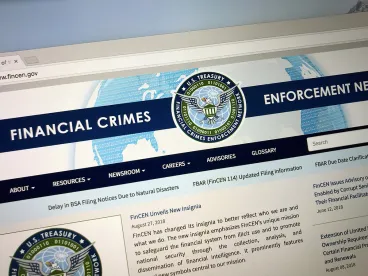The U.S. Treasury Department’s Financial Crimes Enforcement Network (FinCEN) issued final rules on Sept. 30, 2022, implementing Section 6403 of the Corporate Transparency Act, also called the BOI Rules.
Intended by FinCEN to “protect the U.S. financial system from illicit use” when they take effect on Jan. 1, 2024, these final rules will introduce a new federal framework by which businesses operating in the U.S. will be broadly subject to beneficial ownership information reporting requirements, both at the time of a business’s initial formation and upon certain ownership change events.
Who is Subject to the Rules
In general, an entity will be subject to the BOI Rules if it is:
-
A domestic reporting company, defined as a corporation, limited liability company, or other entity that is created by the filing of a document with the secretary of state or any similar office under the law of a state or Native American tribe; or
-
A foreign reporting company, defined as a corporation, limited liability company, or other entity that is formed under the law of a foreign country and that is registered to do business in the U.S. by the filing of a document with a secretary of state or equivalent office under the law of a state or Indian tribe.
Note that this generally excludes legal entities such as trusts and sole proprietorships, to the extent that such entities are not created by the filing of a document with a secretary of state or a similar office.
However, even if an entity fits within the above criteria, FinCEN provides 23 separate exemptions which, if applicable, provide safe harbor for an entity to not submit a Beneficial Ownership Information Report (BOI Report). Some of these 23 exemptions apply to:
-
Large operating companies which employ more than 20 full-time employees in the U.S., filed a federal income tax return in the U.S. demonstrating more than $5 million in gross receipts or aggregate sales, and operate at a physical office within the U.S.;
-
Pooled investment vehicles operated or advised by certain other exempted entities;
-
Investment companies and investment advisers that are registered with the SEC;
-
Venture capital fund advisers that have filed Item 10, Schedule A, and Schedule B of Part 1A of Form ADV with the SEC;
-
SEC reporting companies; and
-
Subsidiaries whose ownership interests are controlled or wholly owned, directly or indirectly, by one or more certain exempted entities.
Importantly, unlike, for example, entities that are engaged in the business of banking or venture capital fund advising, none of the 23 enumerated exemptions specifically tie in with an entity’s business of real estate ownership. Entities engaged in the business of real estate ownership are therefore subject to FinCEN’s reporting requirements unless they happen to fit within a particular exemption.
Who Must Report
In addition to the reporting company itself, there are two categories of persons or entities that must file BOI Reports:
-
Beneficial Owners – A “beneficial owner” is an individual who, directly or indirectly, exercises substantial control over the reporting company or owns or controls 25% or more of the reporting company’s ownership interests.
-
Substantial control – For purposes of the final rules, FinCEN considers an individual to have substantial control over a reporting company if the individual:
-
Is or exercises the authority of a senior officer of the reporting company, such as the reporting company’s chief executive officer, chief operating officer, chief financial officer, and general counsel, but not, for example, individuals performing ministerial tasks, such as a treasurer or executive secretary;
-
Has the authority to appoint or remove senior officers or a majority of the directors or managers of the reporting company;
-
Directs, determines, or has substantial influence over important decisions of the reporting company (such as: major expenditures or investments, incurrence of debt, issuance of equity, or reorganization, dissolution or merger of the company); or
-
Otherwise has direct or indirect substantial control over the reporting company.
-
-
25% ownership or control – FinCEN considers ownership interests to include equity interests, profits interests, convertible instruments, warrants, options, and other such company interests. Ownership interests can be owned or controlled through joint ownership, through a trust arrangement, or other indirect arrangements.
-
Exceptions – There are several practical exceptions that exclude certain beneficial owners from the above reporting requirements, including:
-
Employees who act only as employees (that is, not as senior officers as well), who have substantial control over or gain economic benefits from a reporting company solely because of their employment status; and
-
The nominees, intermediaries, custodians, or agents of an individual who is a beneficial owner.
-
-
-
Company Applicants – The company applicant is the individual who directly files the document that creates a domestic reporting company (or registers a foreign reporting company) or, if more than one individual is involved in the filing, the individual who is primarily responsible for directing or controlling such filing.
What Must be Reported
The BOI Rules establishes two groups of information which must be reported: company information and beneficial owner and company applicant information.
-
Company Information. This is, essentially, a reporting company’s basic organizational information, and consists of its:
-
Full legal name as well as any trade or d/b/a names of the reporting company;
-
Street address for its principal place of business;
-
State, tribal, or foreign jurisdiction of formation; and
-
TIN or foreign tax identification number.
-
-
Beneficial Owner and Company Applicant Information. This is the main purpose of the BOI Report, and must be reported for each “beneficial owner” and “company applicant” (see below for additional detail). This information consists of such person’s:
-
Full legal name;
-
Date of birth;
-
Residential address (with limited exceptions);
-
An image of, and the unique identifying number shown on, any one of the following:
-
Current U.S. passport;
-
Current state-issued driver’s license;
-
Current state, local, or tribal identification document; or
-
If none of the foregoing are applicable to such an individual, the individual’s current foreign passport.
-
-
As an alternative, reporting companies and individuals may apply to FinCEN and obtain a “FinCEN identifier” number that may be submitted to FinCEN in lieu of this information. Entities and individuals must update and correct information in an updated application for a FinCEN identifier, similar to the requirements to update and correct BOI Reports, discussed below.
Note, entities already formed or registered to do business in the U.S. on Jan. 1, 2024 do not need to provide this information with respect to company applicants. Reporting companies are also not required to update information regarding company applicants.
When to First Report
-
New Entities. Entities created on or after Jan. 1, 2024 will be required to submit their BOI Report within the 30 calendar days of the earlier of: the date on which the reporting company receives actual notice from a governmental authority that its formation has become effective; or the date on which a governmental agency first provides public notice (typically, this is when a state agency, like a secretary of state, publishes a company entity on a searchable database available to the public) that the reporting company has been created.
-
Existing Entities. Entities that are already in existence on Jan. 1, 2024, will be required to submit their BOI Reports by Jan. 1, 2025.
Reporting entities also have 30 days to report changes to their initial filing or correct errors in a previous filing.
How to Report; Penalties
Reporting entities will submit their BOI Reports through the Beneficial Ownership Secure System (the “BOSS”) being developed by FinCEN to receive, store, and maintain BOI. Notably, all reports submitted through the BOSS will be exempt from search and disclosure under the Freedom of Information Act.
The BOI Rules provide for civil and criminal penalties for willful violations, including civil penalties of up to $500/day and criminal penalties of up to $10,000 and/or imprisonment for up to two years.
Proposed Rulemaking to Further Implement the BOI Rules
FinCEN proposed additional rules on Dec. 15, 2022, that would govern the disclosure of BOI to certain authorized recipients and the protection of BOI once disclosed. As proposed, FinCEN would be allowed to disclose BOI to:
-
U.S. Federal, state, local, and tribal government agencies;
-
Law enforcement agencies, judges, and prosecutors;
-
Financial institutions that use BOI to facilitate compliance with customer due diligence requirements under applicable law;
-
Federal regulators and other appropriate regulatory agencies that supervise financial institutions; and
-
The U.S. Department of Treasury.
The level of access to BOI would also vary depending on the recipient and circumstances. For example, authorized users from governmental agencies engaged in law enforcement activity would be able to log into the system directly and run searches, and would also have to submit justifications to FinCEN for their searches. By contrast, financial institutions would only be able to request BOI for purposes of complying with customer due diligence requirements, and rather than running direct searches, would instead have to submit a query specific to a reporting company and obtain a transcript with that entity’s BOI.
The proposed rules also require requesting financial institutions to obtain the reporting company’s consent prior to submitting a request for BOI and to maintain a record of such consent, to develop safeguards to protect the confidentiality of BOI, and to limit access to BOI only to the financial institution’s directors, officers, employees, contractors, and agents located in the United States. In addition, financial institutions would have to make certain certifications in connection with their requests for BOI. Comments on these proposed rules must be submitted on or before Feb. 14, 2023.
FinCEN published the proposed form on Jan. 17, 2023, for BOI Reports. Comments on such proposal must be submitted on or before March 20, 2023.
Conclusion
The final rules issued by FinCEN introduce a new and sweeping regulatory regime generally applicable to all businesses operating in the U.S., with limited exceptions. Consistent with the rules themselves, we expect that FinCEN will take an expansive approach to enforcement. The BOI Rules are expected to impact more than 32.5 million entities that will be required to file their first BOI Reports in 2024, and an estimated five million new companies in each following year. In its initial fact sheet related to the BOI Rules, FinCEN anticipated that it would cost a reporting company with a “simple” management and ownership structure approximately $85 to prepare and submit its initial BOI Report. Contrast that with a reporting company with “complex beneficial ownership structures,” which FinCEN estimates will incur costs of approximately $2,600 in connection with submission of its initial BOI Report. For many entities that will be subject to the BOI Rules, including, for example, real estate investors who tend to co-invest with others via LLCs and may own interests in multiple LLCs, these costs are not insignificant. Potential reporting companies should be on the lookout for additional guidance from FinCEN and consult with their legal and other advisors to understand their compliance obligations prior to the date that the BOI Rules take effect.
In addition, banks and other financial institutions that will need to access BOI should remain abreast of FinCEN’s proposed rulemaking and be prepared to develop and implement appropriate protocols to safeguard such information and otherwise comply with the eventual rules.





 />i
/>i

